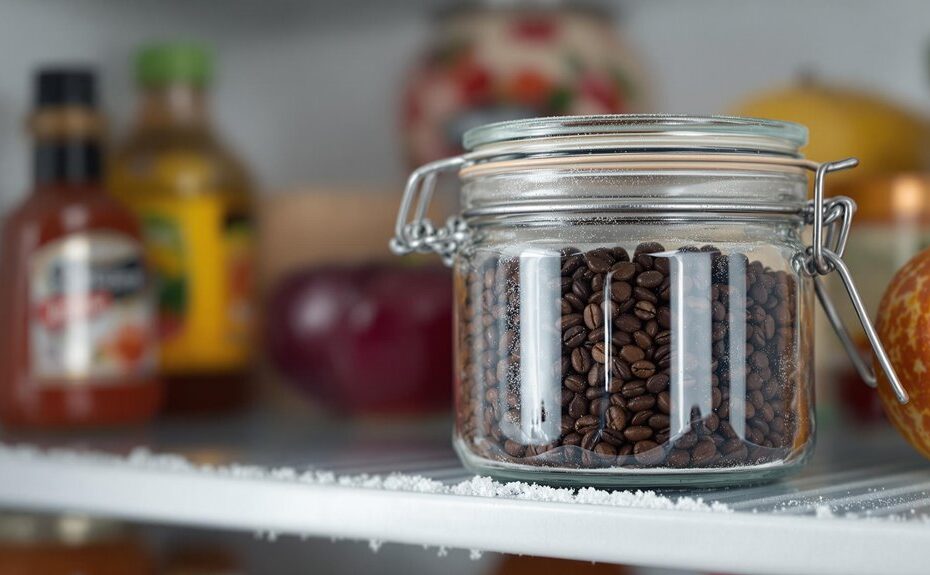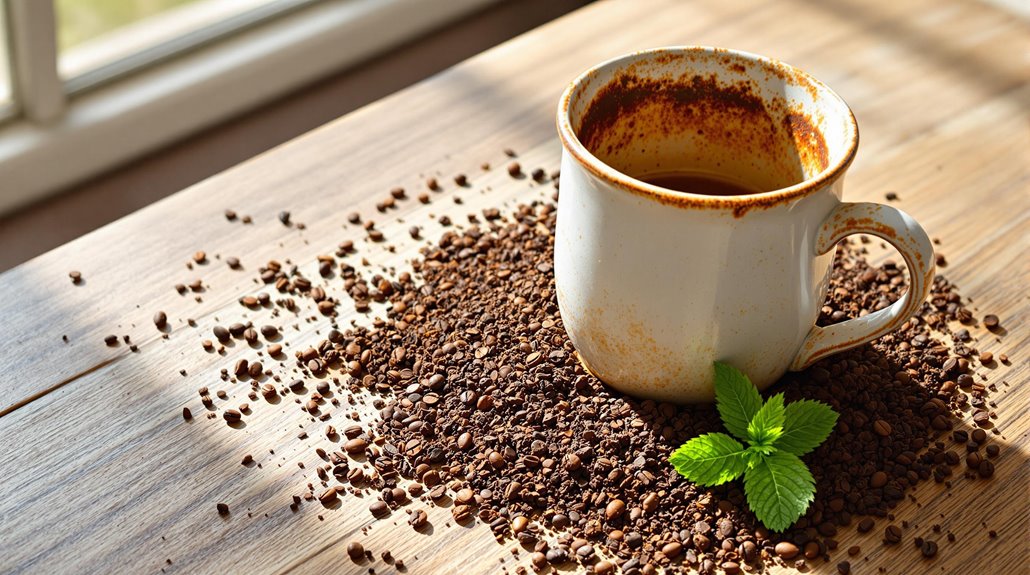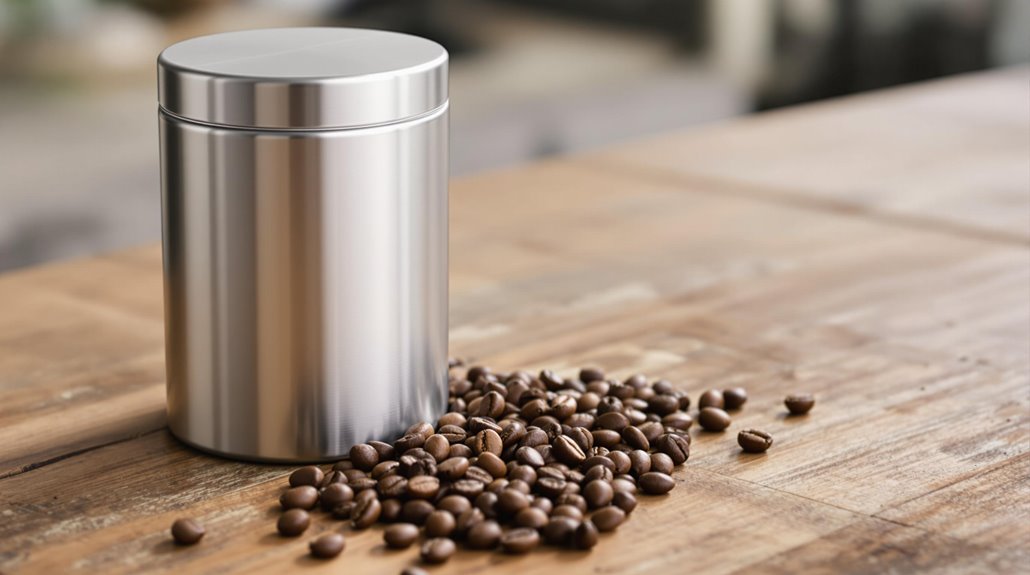







Storing coffee in the fridge might seem like a good idea, but it's trickier than you'd think. You'll need to cool it properly, choose the right container, and avoid letting it absorb odors from other foods. Even then, the fridge's environment can still affect the flavor and freshness of your coffee. So, how do you strike the balance between preserving your brew and avoiding common pitfalls? The answer lies in understanding the nuances of temperature, humidity, and storage duration—factors that could make or break your coffee experience. What's the best way to navigate these challenges? Let's explore.
Key Takeaways
- Use airtight, non-reactive containers like glass or ceramic to prevent moisture and odor absorption.
- Cool brewed coffee to room temperature before refrigerating to avoid condensation and flavor degradation.
- Store coffee in a stable, cool section of the fridge, away from strong-smelling foods and the door.
- Refrigerate only for short-term storage; brewed coffee lasts up to one week, while cold brew lasts up to two weeks.
- Avoid metal or plastic containers, as they can alter the taste and expose coffee to unwanted odors.
Why Refrigerators Are Not Ideal for Coffee
Refrigerators aren't ideal for storing coffee because they create conditions that degrade its quality. The high humidity inside a refrigerator causes coffee to absorb moisture, which compromises its flavor and aroma. Moisture accelerates the staling process, breaking down the volatile compounds responsible for coffee's freshness. Additionally, temperature fluctuations in the fridge lead to condensation, which further increases moisture exposure and promotes mold growth. These conditions not only dull the coffee's taste but also shorten its shelf life.
Refrigerators also expose coffee to odors from other foods, which it readily absorbs due to its porous nature. This results in off-flavors that mask the coffee's natural profile. Even if you store coffee in an airtight container, the constant opening and closing of the fridge door introduces light, which degrades the coffee's molecular structure over time. Experts consistently advise against fridge storage because it disrupts the delicate balance of compounds that define coffee's quality. For ideal flavor and aroma, you should avoid exposing coffee to the moisture, odors, and temperature fluctuations inherent in refrigerator environments.
Proper Cooling and Container Selection
Cool brewed coffee to room temperature before refrigerating to avoid condensation, which can dilute flavor and degrade quality. Use airtight, non-reactive containers made of glass or ceramic to prevent taste alteration caused by metal or plastic. Make sure the container is clean, dry, and free of residual odors to maintain the coffee's integrity during storage.
Optimal Container Types
Selecting the right container for storing coffee in the fridge is essential to preserving its flavor and freshness. Use airtight containers to prevent exposure to air, which can cause oxidation and stale your coffee. Glass containers are ideal because they're non-reactive and won't absorb odors from the fridge. Avoid metal containers, as coffee's acidity can react with the material, leading to off-flavors over time. Guarantee the container has tight-fitting lids to create a secure seal, minimizing air infiltration. Opt for opaque or dark-colored containers to block light, which can degrade coffee quality by breaking down its compounds. Before use, make sure the containers are clean and dry to avoid contamination or moisture buildup, which can compromise the coffee's integrity. By choosing the right container—airtight, non-reactive, and light-blocking—you'll maintain the coffee's aroma and taste, confirming it stays fresh for longer.
Cooling Temperature Guidelines
To preserve the quality of your brewed coffee, it's crucial to let it cool to room temperature—around 68-72°F (20-22°C)—before transferring it to the fridge. Cooling coffee to this range prevents condensation, which can dilute flavors and degrade freshness. Once cooled, store your coffee in an airtight, non-reactive container, such as glass or ceramic, to maintain its integrity. Avoid using metal or plastic containers, as they can impart unwanted tastes or odors.
When storing coffee in the fridge, make sure the temperature stays consistent at 40°F (4°C) or below. This slows oxidation, keeping your coffee fresh for longer. However, avoid storing coffee in the fridge for more than 1-2 weeks, as prolonged exposure to cold can dull its flavors and aromas. Tightly seal the container to prevent your stored coffee from absorbing odors from other foods, which can compromise its quality.
For storing your beans, the same principles apply: cool them to room temperature before refrigeration and use airtight containers. Fresh coffee needs careful handling to retain its complex flavors, so always prioritize proper cooling and container selection for the best coffee storage.
Avoiding Flavor Contamination in the Fridge
One of the most critical steps in preserving coffee's flavor is preventing it from absorbing odors in the fridge. Coffee beans, especially whole beans, are highly hygroscopic, meaning they easily absorb surrounding odors, which can compromise their taste. To store coffee effectively, always use airtight containers made of glass or ceramic, as these materials provide a robust barrier against strong odors like garlic, onions, or spices. Make sure the containers have tight-fitting lids to minimize exposure to moisture and fridge odors. Avoid placing coffee near pungent foods, as even a slight exposure can lead to flavor contamination. Additionally, keep your coffee away from the fridge door, where temperature fluctuations and light exposure are more frequent, further risking odor absorption. Label your containers clearly to prevent confusion and confirm they remain sealed when not in use. By following these steps, you'll maintain the integrity of your coffee's flavor profile and avoid the risk of it picking up unwanted aromas from other items in the fridge.
How Long Coffee Lasts in the Fridge
The lifespan of coffee in the fridge depends on its form and storage conditions. If you store your coffee as brewed coffee in an airtight container, it can last up to one week while retaining reasonable freshness. However, if you add milk or cream to your cup of coffee before refrigeration, its shelf life drops to 1-2 days due to dairy spoilage risks. Cold brew concentrate, on the other hand, remains fresh for up to two weeks in the fridge because of its lower acidity and higher concentration. Ground coffee, especially freshly ground, loses its aroma and flavor quickly, so it's best to use it within a week when stored in the fridge. Always make sure your coffee in the fridge is sealed properly and kept away from strong-smelling foods to avoid flavor contamination. Reheating refrigerated coffee more than once can degrade its quality, so consume it within 24 hours of reheating for the best experience. Proper storage and timely consumption are key to maintaining the integrity of your coffee.
Common Mistakes When Storing Coffee in the Fridge
Storing coffee in the fridge without airtight packaging exposes it to moisture and condensation, which accelerates staleness and compromises flavor. Refrigerators also introduce odor absorption risks, as coffee readily absorbs aromas from other foods, altering its natural profile. These factors collectively degrade coffee quality, making improper storage a critical mistake to avoid.
Odor Absorption Risks
Coffee beans act like sponges, soaking up odors from your fridge, whether it's last night's garlic-heavy dinner or pungent leftovers. Their porous nature makes them highly susceptible to absorbing odors, which can drastically alter their flavor profile. When you store coffee in the fridge, it's exposed to a variety of strong smells, from onions to cheese, that can permeate the beans or grounds. Even if you use airtight containers, the coffee's porous structure allows it to absorb these odors over time, leading to flavor degradation. The fridge's environment, with its fluctuating temperatures, exacerbates this issue by increasing the rate at which coffee absorbs unwanted aromas. This compromises the coffee's natural aroma and results in a dull, off-putting taste. Additionally, the presence of moisture in the fridge can accelerate this process, as condensation forms on the beans or grounds, further enhancing their ability to absorb odors. To preserve the integrity of your coffee's flavor, avoid fridge storage altogether, as the risks of odor absorption far outweigh any perceived benefits.
Moisture and Condensation Issues
When you store coffee in the fridge, it's exposed to high humidity levels, which can lead to moisture absorption and significant flavor degradation. The fridge's environment promotes condensation, especially when cold coffee is exposed to warmer air. This moisture causes coffee grounds or beans to clump, accelerating staling and diminishing their aroma. Additionally, temperature fluctuations in the fridge create condensation inside storage containers, further exposing coffee to moisture. This process causes the natural oils in coffee to oxidize faster, resulting in a bitter or stale taste. Over time, the combination of humidity and condensation degrades the coffee's flavor profile, making it less enjoyable. To minimize these issues, make certain your coffee is stored in an airtight container to limit exposure to moisture and humidity. Avoid repeatedly opening the container, as this introduces warm air and increases condensation. While refrigeration can seem convenient, the risks of moisture and condensation often outweigh the benefits, leading to irreversible flavor degradation. For peak freshness, consider alternative storage methods that protect coffee from these damaging factors.
Alternatives to Refrigerator Storage for Coffee
A cool, dark cupboard can be your coffee's best ally, offering a stable environment that shields it from light, heat, and humidity. To store fresh whole beans effectively, place them in an airtight container with one-way valves, which allow carbon dioxide to escape while preventing oxygen from entering. This setup minimizes oxidation, preserving the beans' flavor and aroma. Keep the container in a cool, dark cupboard away from heat sources like ovens or stoves, as temperature fluctuations can degrade the coffee's quality.
For peak freshness, purchase coffee in smaller quantities and consume it within 2-4 weeks of roasting. Avoid freezing coffee unless absolutely necessary; if you must, use a deep freezer and airtight, freezer-quality bags for short-term storage. Never refreeze thawed beans, as this can introduce moisture and compromise flavor. By prioritizing these storage methods, you'll maintain the integrity of your coffee without relying on the fridge, which can expose beans to moisture and condensation.
Disclosure: As an Amazon Associate, I earn from qualifying purchases.




